|
|
|
Sort Order |
|
|
|
Items / Page
|
|
|
|
|
|
|
| Srl | Item |
| 1 |
ID:
179481
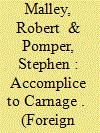

|
|
|
|
|
| Summary/Abstract |
In late March 2015, Saudi o5cials came to the Obama administration with a message: Saudi Arabia and a coalition of partners were on the verge ofintervening in neighboring Yemen, whose leader had recently been ousted by rebels. This wasn’t exactly a bolt from the blue. The Saudis had been 4agging their growing concerns about the insurgency on their southern border for months, arguing that the rebels were proxies for their archrival, Iran.
|
|
|
|
|
|
|
|
|
|
|
|
|
|
|
|
| 2 |
ID:
151371
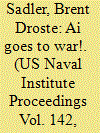

|
|
|
|
|
| Summary/Abstract |
Before an autonomous machine kills the first human on the battlefield, the U.S. military must have an ethical framework for employing such technology.
|
|
|
|
|
|
|
|
|
|
|
|
|
|
|
|
| 3 |
ID:
162573
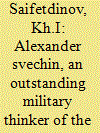

|
|
|
|
|
| Summary/Abstract |
The paper gives a concise biography and covers major stages in the life of the great military scholar, as well as the more important points from his basic works, which are still topical today.
|
|
|
|
|
|
|
|
|
|
|
|
|
|
|
|
| 4 |
ID:
189959
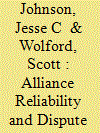

|
|
|
|
|
| Summary/Abstract |
States form defensive alliances hoping to deter adversaries and avoid war. However, scholars and policy analysts often worry that if an alliance fails to deter the promise of military support will encourage escalation, pushing disputants closer to war. We show that in many cases this concern is unwarranted. We use a game-theoretic model of alliance reliability and crisis bargaining to show that the same factors that indicate unreliability and provoke disputes also encourage alliance members to make concessions rather than risk war. We test this hypothesis using a sample of militarized disputes initiated against members of defensive alliances, where recent shifts in military capabilities represent changes in challengers’ estimates of alliance reliability. Less-reliable alliances are less likely than reliable allies to deter disputes, but they also decrease the probability of escalation relative to reliable alliances. Unreliable alliances need not encourage war; rather, they can discourage it.
|
|
|
|
|
|
|
|
|
|
|
|
|
|
|
|
| 5 |
ID:
149474


|
|
|
|
|
| Summary/Abstract |
The scientific study of war has largely ignored necessary conditions for war onset. Conflict scholars have previously identified alliances as a mechanism that brings about the initial expansion of war but have not examined whether it is a prerequisite for large wars. We argue that wars diffuse into multiparty wars only in the presence of alliances. In other words, in the absence of any alliance ties, war would not include more than two parties. We put forth a theoretical rationale for this relationship and conduct a series of tests on both dyadic and multiparty wars between 1816 and 2007. These tests provide support for our hypothesis, suggesting that alliances are a virtual necessary condition for multiparty wars: the larger the war, the more likely alliances are a necessary condition.
|
|
|
|
|
|
|
|
|
|
|
|
|
|
|
|
| 6 |
ID:
144945
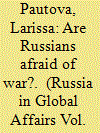

|
|
|
|
|
| Summary/Abstract |
Social phenomena do not usually occur suddenly but ripen gradually. Often social manifestations hide behind seemingly insignificant fashionable trends. The fear of war in recent years is revealed in worried, although almost invisible, attitudes expressed during opinion polls. Concurrently, a military style trend has slowly but steadily entered everyday life: paintball and shooting sports are incredibly popular; teenage girls wear combat boots, camouflage clothing, and dog tags. Indeed, T-shirts with images of "Polite People" and the Iskander and Topol missile systems are in high demand. If we put these fashion trends into the context of the nationwide celebrations of the 70th anniversary of the victory in World War II, the military theme is hard to miss.
|
|
|
|
|
|
|
|
|
|
|
|
|
|
|
|
| 7 |
ID:
140084
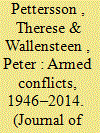

|
|
|
|
|
| Summary/Abstract |
In 2014, the Uppsala Conflict Data Program (UCDP) recorded 40 armed conflicts with a minimum of 25 battle-related deaths, up by six from 2013. This is the highest number of conflicts reported since 1999, and 11 of these conflicts were defined as wars, that is, conflicts generating 1,000 or more battle-related deaths in one calendar year. Further, an escalation of several conflicts, coupled with the extreme violence in Syria, resulted in the highest number of battle-related deaths in the post-1989 period. Yet, compared to the large-scale interstate wars of the 20th century, the number of fatalities caused by armed conflicts in 2014 was relatively low. Additionally, seven conflicts identified in 2013 were no longer active in 2014. However, four new conflicts erupted in 2014, all of them in Ukraine, and three previously registered conflicts were restarted by new actors. Furthermore, six conflicts reoccurred with previously registered actors. A positive development, however, is the increase to ten of the number of peace agreements concluded and signed in 2014, which represents a further four compared with 2013. And although this increase is part of a positive trend since 2011, it is worth noting that several peace processes remained fragile by the end of the year.
|
|
|
|
|
|
|
|
|
|
|
|
|
|
|
|
| 8 |
ID:
155201
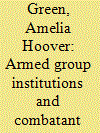

|
|
|
|
|
| Summary/Abstract |
Ex-combatants who fought with the Salvadoran Army during El Salvador’s 1980–92 civil war often recall being ‘captured’, rather than recruited, suffering beatings and humiliation in the course of training, and fighting without a sense of purpose or direction. Those who served with rebel forces, by contrast, recall fatigue and frustration with new routines, but seldom hazing or abuse; most also recalled deep, ongoing instruction about the purpose and goals of the war. This comparison highlights the broad variation in armed groups’ formal institutions for socialization, a topic that political scientists have only recently begun to examine in depth. The Salvadoran case also emphasizes some shortcomings of the existing literature, which may elide the differing effects of different formal institutions, treat individual institutions as operating independently on combatant behavior, and/or fail to map complex causal processes intervening between institutions and behavior. This article takes as its starting point the observation that many armed group institutions – including recruitment, military training, political training, and disciplinary regimes – are components of the process known more generally as ‘combatant socialization’. Examining specific institutional processes associated with combatant socialization allows for the generation of more refined and specific theories of combatant socialization as both a causal variable and an outcome. At the same time, treating armed group institutions as related elements of a broader process, rather than as fully separate institutions, may also advance understandings of the effects of these institutions. I demonstrate that the implementation and content of formal institutions for socialization varied significantly both across and within groups in El Salvador; building on this analysis, I lay out several potential directions for comparative research.
|
|
|
|
|
|
|
|
|
|
|
|
|
|
|
|
| 9 |
ID:
170849
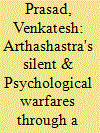

|
|
|
| 10 |
ID:
160048
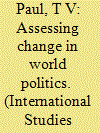

|
|
|
|
|
| Summary/Abstract |
This introductory paper of the presidential issue examines IR theory's problems and prospects in understanding when and how change happens, especially peaceful transformations in world politics. The ISA 2017 Baltimore conference was aimed at taking an assessment of our understanding of change, its different manifestations as well as implications. The papers in this special issue deal with important questions on different markers and manifestations of change in world politics. The implications might range from epochal transformations to limited changes in the international system, especially within and between regions to incremental changes in how international treaties and global governance initiatives are promulgated, which in turn produce long-term and/or short-term changes in the architecture of world politics. It also addresses the following questions: How do different IR paradigms address change? What are their strengths and weaknesses? Can we understand change sequentially or cumulatively or combining their insights? How do material and ideational factors link together in generating change?
|
|
|
|
|
|
|
|
|
|
|
|
|
|
|
|
| 11 |
ID:
140323
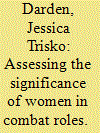

|
|
|
|
|
| Summary/Abstract |
What should we know about the roles of women in armed conflicts? I review the existing literature on women’s roles in regular and irregular conflicts to identify gaps in our understanding of the significance of female combatants. I draw on contemporary and historical cases of women’s combat participation across world regions and, in so doing, I challenge existing assumptions about the limits of women’s participation in armed conflict. Examining women as a group and expecting conflict to affect this group in predictable and easily identifiable ways only reinforces existing assumptions about women and war. To understand the range of motivations underlying women’s decisions to fight or to not fight, we should give greater attention to opportunity structures and other social conditions rather than simply assuming that women have different incentives than men.
|
|
|
|
|
|
|
|
|
|
|
|
|
|
|
|
| 12 |
ID:
161703
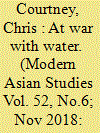

|
|
|
|
|
| Summary/Abstract |
This article offers a critical reappraisal of the Maoist state's response to the 1954 Yangzi floods. It uses a variety of sources, including previously classified government reports and oral history testimony, to challenge the official narrative. It argues that, far from being a remarkable victory for the new government, the flood was a humanitarian catastrophe that caused almost 150,000 deaths. Government hydraulic policies were partly to blame, as the vast majority of disaster victims were located in rural areas that were flooded deliberately in order to protect cities. In addition to revealing the true scale of the flood, this article uses the disaster as a prism to examine the early Maoist state. The government's combative environmental policies turned disaster governance into a war on water. This approach had certain benefits, particularly in terms of organizing an effective urban relief campaign. Unfortunately, campaign politics fostered an atmosphere of distrust, which encouraged many citizens to resist disaster-prevention policies. The example of the 1954 flood reveals the profound impact that a political context can have upon the outcome of a supposedly natural disaster.
|
|
|
|
|
|
|
|
|
|
|
|
|
|
|
|
| 13 |
ID:
152722
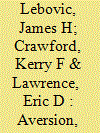

|
|
|
|
|
| Summary/Abstract |
How significant is gender in explaining US public opinion regarding civilian casualties inflicted by the US military during combat and counterterror operations? For answers, we test experimental treatment models on original data obtained from pre-election and post-election surveys conducted as part of the 2014 Cooperative Congressional Election Study. Our evidence supports prior claims that women support military action more reluctantly than men, but, much like men, condition their positions on the accompanying human costs. We find, nonetheless, that women are less likely to support attacks that might bring high numbers of civilian deaths, and, unlike men, base their support on the potential gains from an attack. Indeed, we conclude that differences in support for military action between men and women stem more from the perceived benefits of the attacks than from human costs.
|
|
|
|
|
|
|
|
|
|
|
|
|
|
|
|
| 14 |
ID:
175117
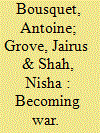

|
|
|
|
|
| Summary/Abstract |
Under the banner of martial empiricism, we advance a distinctive set of theoretical and methodological commitments for the study of war. Previous efforts to wrestle with this most recalcitrant of phenomena have sought to ground research upon primary definitions or foundational ontologies of war. By contrast, we propose to embrace war’s incessant becoming, making its creativity, mutability and polyvalence central to our enquiry. Leaving behind the interminable quest for its essence, we embrace war as mystery. We draw on a tradition of radical empiricism to devise a conceptual and contextual mode of enquiry that can follow the processes and operations of war wherever they lead us. Moving beyond the instrumental appropriations of strategic thought and the normative strictures typical of critical approaches, martial empiricism calls for an unbounded investigation into the emergent and generative character of war. Framing the accompanying special issue, we outline three domains around which to orient future research: mobilization, design and encounter. Martial empiricism is no idle exercise in philosophical speculation. It holds the promise of a research agenda apposite to the task of fully contending with the momentous possibilities and dangers of war in our time.
|
|
|
|
|
|
|
|
|
|
|
|
|
|
|
|
| 15 |
ID:
191600
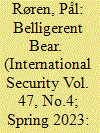

|
|
|
|
|
| Summary/Abstract |
Do states get higher social status from fighting? The prestige of war depends on the type of “status order” that it is interpreted in. Status orders condition and enable the pursuit and recognition of status within social clubs of world politics. Depending on the status order, social clubs may either value or stigmatize belligerence. An analysis comparing the status recognition that Russia received in three social clubs (the great power club, the G-8, and the UN Security Council) after it annexed Crimea and invaded eastern Ukraine in 2014 explores this assumption. The analysis shows that war generated different status effects on Russia's status within each of these clubs. Contrary to popular belief, and amid widespread condemnation, Russia was increasingly recognized as a great power within U.S. public discourse. In contrast, Russia's belligerence diminished its status within the G-8 and had little effect on its status in the UN Security Council. The findings underline the importance of context in estimating status effects of participating in wars and any other behavior that might impact a state's standing in world politics.
|
|
|
|
|
|
|
|
|
|
|
|
|
|
|
|
| 16 |
ID:
157273
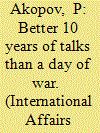

|
|
|
|
|
| Summary/Abstract |
ANDREI GROMYKO, an outstanding politician and diplomat, used to say: "Better 10 years of talks than a day of war." I often heard him say this - a saying that has now effectively become an aphorism. He regarded bilateral and multilateral talks as an important diplomatic tool that should be used in national interests. At the same time, Gromyko stressed that talks should be conducted by relying on economic power, not from a position of strength.
|
|
|
|
|
|
|
|
|
|
|
|
|
|
|
|
| 17 |
ID:
192576
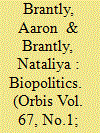

|
|
|
|
|
| Summary/Abstract |
COVID-19 and the subsequent global response have had a profound impact on the public health, economic health, and political health in nearly every country. This article examines the biopolitics of power and pandemics in war. Three case studies are presented: the Spanish influenza outbreak of 1918–1920 and responses to the COVID-19 outbreak in both Syria and in eastern Ukraine. The pandemic’s impact has been particularly acute in active warzones, undermining the ability of governments and organizations to enforce public health recommendations, provide for the care of patients, secure supplies, and transmit information.
|
|
|
|
|
|
|
|
|
|
|
|
|
|
|
|
| 18 |
ID:
163213


|
|
|
| 19 |
ID:
183922
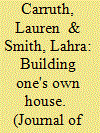

|
|
|
|
|
| Summary/Abstract |
This study uses ethnography along Ethiopian women's irregular migration routes through Djibouti to analyse the complex reasons women leave home to seek labour opportunities in the Gulf States. Theories and policies that either narrowly depict women's motivations as economic in nature or focus only on women's needs for security and protection, fail to account both for the politics of seeking employment abroad, and the ways migration provides women a potential refuge from various forms of violence at home. Using a feminist analysis, we argue that women do not migrate only for financial opportunities, but also to escape combinations of domestic, political and structural violence. As such, irregular migration both evinces a failure of asylum systems and humanitarian organisations to protect Ethiopians, and a failure of the state to provide Ethiopian women meaningful citizenship. Lacking both protection and meaningful citizenship, international migration represents women's journeys for opportunity and emancipation.
|
|
|
|
|
|
|
|
|
|
|
|
|
|
|
|
| 20 |
ID:
172579
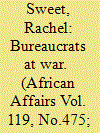

|
|
|
|
|
| Summary/Abstract |
Rebels often portray themselves as state-like to legitimize their rule, yet little is known about their on-the-ground relations with the administrators of state power—official bureaucrats. Drawing on internal armed group records from the Democratic Republic of Congo, this article argues that rebels’ state-like image is more than a simple veneer: Bureaucrats actively sustain state institutions and recruit rebel support during war. It develops a theory of the sources of leverage that bureaucrats use to negotiate with rebels. These interactions entail dual struggles to sustain the structures and symbols of state power and to shape the distribution of control over these institutions during war. On first front, bureaucrats can use their official status to market the symbols of state legitimacy—official certificates, codes, and paperwork—to rebels. On a second, to recruit protection for administrative posts. Pre-existing routines of noncompliance, like parallel taxes and sabotaged information, can use bureaucratic discretion and opacity to limit rebels’ takeover of state structures. This view from the ground demonstrates the real-time continuity of bureaucratic practice through daily paperwork and exchange during war. It contributes to research on rebel governance by illustrating new competitions for wartime statehood and illustrates the empirical practices of states seen as ‘juridical’ or weak.
|
|
|
|
|
|
|
|
|
|
|
|
|
|
|
|
|
|
|
|
|